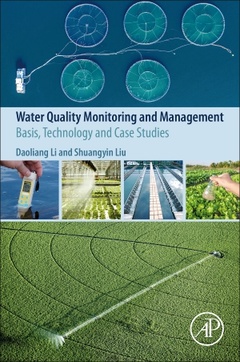Description
Water Quality Monitoring and Management
Basis, Technology and Case Studies
Authors: Li Daoliang, Liu Shuangyin
Language: English
Subjects for Water Quality Monitoring and Management:
368 p. · 15x22.8 cm · Paperback
Description
/li>Contents
/li>Biography
/li>Comment
/li>
Water Quality Monitoring and Management: Basis, Technology and Case Studies presents recent innovations in operations management for water quality monitoring. It highlights the cost of using and choosing smart sensors with advanced engineering approaches that have been applied in water quality monitoring management, including area coverage planning and sequential scheduling. In parallel, the book covers newly introduced technologies like bulk data handling techniques, IoT of agriculture, and compliance with environmental considerations. Presented from a system engineering perspective, the book includes aspects on advanced optimization, system and platform, Wireless Sensor Network, selection of river water quality, groundwater quality detection, and more.
It will be an ideal resource for students, researchers and those working daily in agriculture who must maintain acceptable water quality.
S. Liu received his B.E. degree in the Department of Computer Science, Air Force Engineering University in 2002 and his M.E. degree in Faculty of Computer, Guangdong University of Technology in 2006. He is a Ph.D. student in the College of Information and Electric Engineering of China Agriculture University. He is a lecturer in the College of Information, Guangdong Ocean University, and he is a member of China Computer Federation. He primary research interests are intelligent information system of agriculture, artificial intelligence, software engineering, computational intelligence.
- Discusses field operations research and application in water science
- Includes detection methods and case analysis for water quality management
- Encompasses rivers, lakes, seas and groundwater
- Covers water for agriculture, aquaculture, drinking and industrial uses

